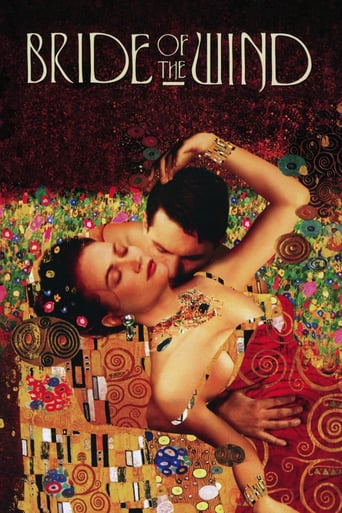Armand
Alma Mahler is one of impressive legends of Mitteleuropa. To describe her life is an Utopian endeavor. Her power, art of seduction, fights and ambitions, her relationship with flower of Austrian culture, the American experience and his prestige are parts of unique existence without any explanation.In this film, Alma is only a character. Oversimplified, mosaic of clichés, image in a steamed mirror. It is only a hasty sketch, message less, artificial, in who the charm of Sarah Wynter is unique trap for spectator. It is not, at least, a cogent disappointed.The Jonathan Pryce acting is interesting but irrelevant. The atmosphere is only illusion of a gorgeous period. And the story falls in abyss. Alma Mahler is more that a beautiful doll. She is a magnificent legend of a amber time.
trpdean
The story of a pioneering, cold and fickle groupie, this movie is one to avoid. Vienna 1902-1919. A good setting for any movie -- it's doubtful that the moviegoer is more familiar with any other period of twentieth century (we have countless monographs, full-scale biographies, novels, histories, museum exhibitions, and concerts devoted to Schnitzler and Musil, Joseph Roth and Grillparzer, von Hoffmansthal and Mahler, Bruckner and Freud, Kokoschka and the other expressionists, Klimt and Jung and the rise of Schoenberg and Jung, Webern and Adler, -- as well as weekly publication for the last few decades of studies of the rise of political anti-semitism - Schnorer, etc.). Yet: a) the movie wastes a few hours to uninformatively tell us that Mahler was a composer and conductor (!), that Kokoschka painted and sculpted un-pretty things (!), that Gropius was an architect who speaks once in praise of form and the absence of adornment, and that Werfel liked to sing and demonstrated against the government. That's it. There really is no more insight into these people.**** SPOILERS**** b) we see a deeply unsympathetic woman who, for no real reason we can see, has an affair with an architect the first time she's away from her children and husband Mahler (telling him - comically - that he "forced her into the man's arms"! and expressing no remorse), then informs the architect into whose arms she was "forced" that she would not stay with her husband - when Mahler is dead, she shacks up again with the architect and resumes her fornication but then decides to go after a painter. We aren't told why she loses her interest in the architect. Later, big with child with the painter who deeply loves her, she kills the child and abandons the artist as World War I begins. Why? We don't learn. She says to one that she was "suffocated". Really? We don't see it. So, when our painter returns from the War, he sees that she's returned to being the concubine of yet another! And is pregnant again with that man's child.Yet we never ever see what draws any of the men to her - except that she aggressively goes after them like any groupie - whether she's married or unmarried, whether they wish it or not.This is truly an anti-feminist story about a woman who found her identity only in that of men - and frantically went from one to another, willing to be sexually used to gain proximity.In an age when so many women made their names famous through their work (Vanessa Bell, Virginia Woolf, Edith Wharton, Katherine Mansfield, Colette, dozens of others in the arts), Alma Schindler Moll Mahler Gropius Werfel managed only to lengthen her own by lying on her back and encourage famous men to go ahead. It's hard to find this appealing.
dvmason
Alma Schindler was a fascinating woman, with considerable talent of her own, who served as a muse for Gustav Mahler and several other important artists in turn-of-the-19th-century Vienna. Based on this portrayal, this would be a person I would love to know!I found this to be a wonderful, subtle, portrayal of her life and times, capturing not only her talent, but her challenges and the compromises that she made (particularly in the context of 1910 Vienna). All the leads were well chosen, particularly Schindler, Mahler, and Klimt.I would strongly recommend this movie to anyone with an interest in the way of the artist, feminism (not overt, but much food for thought), or the artistic ferment in early 20th century Vienna.
ozlock
The rating of others amazes me. However, I do think that one might need to be a classical movie lover, and perhaps a Mahler lover. This is a great movie, and it has everything: beauty, taste, sex, mystery and a fascinating ending with the doings of Alma's daughter. The most amazing thing is the incredible feminism of Alma for the time--a time two decades before women in the US gained their franchise. For that reason alone, it is a fascinating movie. But be warned: I hate just about every movie one can see in the houses today with people flying up walls and employing robots to do their evils. This is a thinking person's movie.



